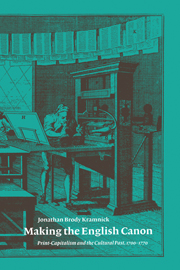Chapter 1 - The structural transformation of literary history
Published online by Cambridge University Press: 22 September 2009
Summary
Few notions may appear so essential to a literary canon as the antiquity of its authors. What is a canon, after all, if not a pantheon of older writers and their great works? For much of the eighteenth century, however, the English canon consisted of writers valued for their modernity. This is not to say that antiquity was entirely a late arriving concept. The seventeenth and early eighteenth century had a settled notion of the ancients. But the ancients were writers from the classical age of Greece and Rome: Homer and Virgil in epic poetry, Sophocles in drama, Horace in satire, and so forth. In its initial moment, the English canon consisted of modern authors who were understood to write like their ancient predecessors. Denham and Waller, for instance, composed with a stately decorum akin to the Greeks and the Romans. The idea of a particularly English antiquity,against which modern English pales, developed gradually during the eighteenth century as critics began to think through the conditions of literary culture and society. This chapter explores the transformation in the narrative of English literary history that gave to us the modern form of the canon: a trinity of English ancients. Criticism's lasting idea of English antiquity, I argue, grew out of a prolonged consideration of the contexts of reading: the uneven distribution of print and literacy, the professionalization of criticism and scholarship, the institutions of print culture, and the commerce in books.
- Type
- Chapter
- Information
- Making the English CanonPrint-Capitalism and the Cultural Past, 1700–1770, pp. 15 - 53Publisher: Cambridge University PressPrint publication year: 1999



